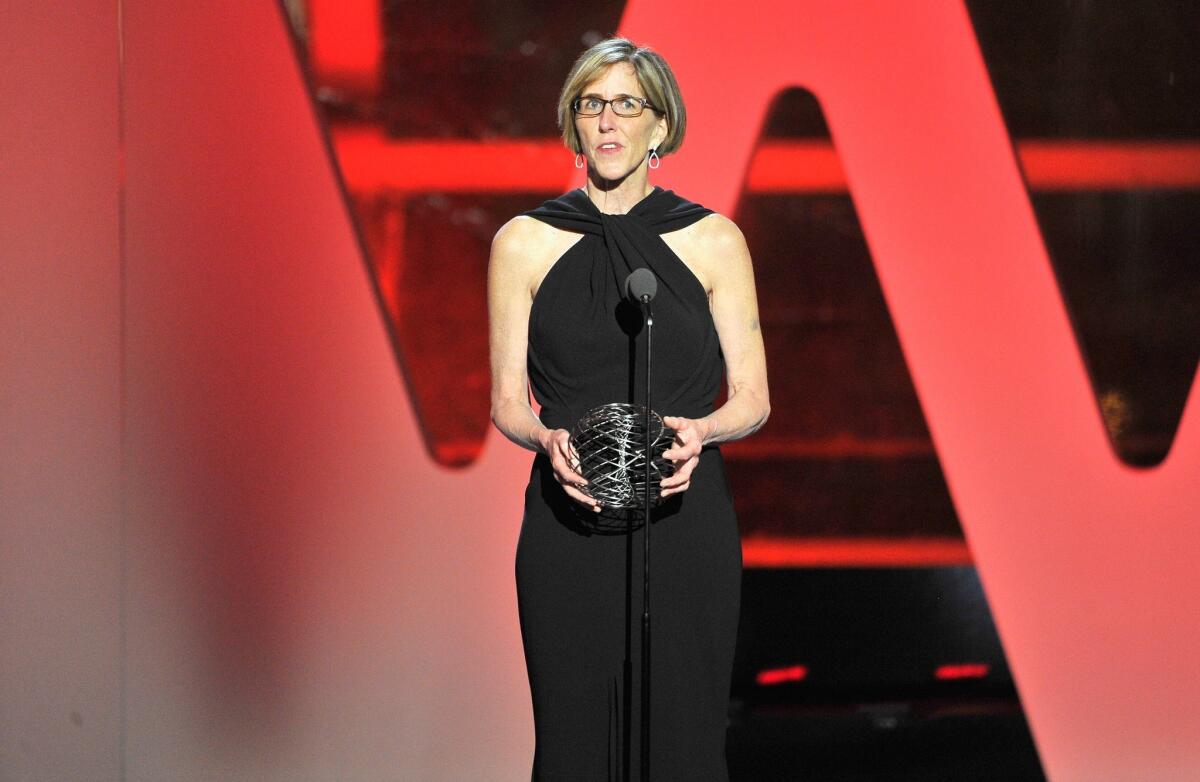Scientists get celebrity treatment at Breakthrough Prize award ceremony

Dr. Helen Hobbs speaks onstage after accepting a Breakthrough Prize for her research into cardiovascular and liver diseases. Hobbs was one of five life sciences award winners; two other awards honored work in fields of physics and mathematics.
- Share via
Scientists got the red carpet treatment Sunday night as luminaries from Hollywood and Silicon Valley handed out Breakthrough Prizes worth a total of $22 million.
The awards honored researchers from the fields of neuroscience, genetics, fundamental physics and mathematics.
“This is our moment to celebrate scientific achievement,” said Facebook Chief Executive Mark Zuckerberg, one of the Breakthrough Prizes founders. “Through science, we have an amazing opportunity as a society: We don’t just get to see the world as it is, but as it can be.”
Five of the 10 awards went to researchers working in the life sciences, including:
Svante Paabo, who has pioneered efforts to decode ancient DNA to learn more about the origin of our species. Paabo is director of the Max Planck Institute for Evolutionary Anthropology in Leipzig, Germany.
Karl Deisseroth, a neuroscientist and bioengineer at Stanford who is developing a field known as optogenetics. Deisseroth uses light to control neurons in the brains of research animals, changing their behavior in the process.
Edward Boyden, another optogenetics researcher at MIT. He is using the technology to understand how networks in the brain give rise to thoughts and emotions, and to see if they can manipulate those networks to improve the lives of patients with conditions like Parkinson’s disease and epilepsy.
John Hardy, a geneticist and molecular biologist at University College London who has been studying Alzheimer’s disease since the 1980s. He is credited with discovering the first genetic mutation linked to the disease.
Dr. Helen Hobbs, who studies how DNA variants make some people more (or less) susceptible to cardiovascular and liver diseases. Her research at the University of Texas Southwestern Medical Center has provided a road map for creating drugs that could help people control their cholesterol.
The prize for Fundamental Physics was jointly awarded to five research groups studying neutrinos, tiny yet unimaginably numerous subatomic particles that may be responsible for the existence of matter in the universe. Two of the Breakthrough Prize winners were honored with the 2015 Nobel Prize in physics – the Super-Kamiokande Collaboration in Japan and the Sudbury Neutrino Observatory in Canada. The other three were the Daya Bay Reactor Neutrino Experiment, led by researchers in China and the U.S., the KamLAND Collaboration in Japan and the K2K and T2K Long Baseline Neutrino Oscillation Experiments, also in Japan.
Finally, Ian Agol of UC Berkeley won the Breakthrough Prize for Mathematics for his work in geometry and topology. Among other things, Agol provided proofs for two longstanding conjectures about certain types of three-dimensional shapes.
Each of the prizes comes with $3 million.
Eight other young scientists received New Horizons awards for research in math and physics. Finally, high school student Ryan Chester of Ohio won a prize for this engaging video explaining Albert Einstein’s theory of special relativity using a minivan, a bowl of popcorn and other props.
The Breakthrough Prizes were handed out at the NASA Ames Research Center in the heart of Silicon Valley. The Golden Globes-style ceremony was hosted by Seth MacFarlane, executive producer of the 2014 reboot of the “Cosmos” documentary series. The winners were serenaded by Pharrell Williams and feted by NASA astronaut Scott Kelly, currently serving a one-year stint aboard the International Space Station. A prerecorded message from physicist Stephen Hawking (himself the subject of an Oscar-nominated biopic) kicked off the telecast.
In addition to Zuckerberg, the prizes were founded by Google co-founder Sergey Brin; his ex-wife Anne Wojcicki, co-founder of the personal genetics company 23andMe; Dr. Priscilla Chan, a pediatrician married to Zuckerberg; Jack Ma, founder of the Chinese e-commerce giant Alibaba, and his wife, Cathy Zhang; and Russian physicist and venture capitalist Yuri Milner and his artist wife, Julia.
The ceremony aired on the National Geographic Channel and will be rebroadcast on Fox on Nov. 29.
Follow me on Twitter @LATkarenkaplan and “like” Los Angeles Times Science & Health on Facebook.
MORE FROM SCIENCE
Proposed lethal injection drugs once hailed as ‘sleep cures’
Religion doesn’t make kids more generous or altruistic, study finds
Getting your blood pressure even lower: Here are the risks and rewards







